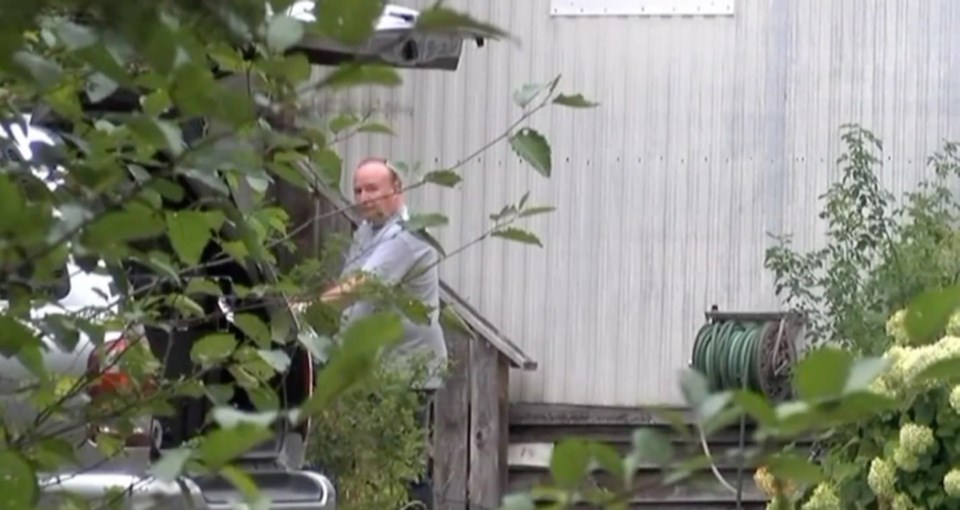A Shawnigan Lake man facing extradition to the United States in connection with a decades-old homicide in California appeared in B.C. Supreme Court on Wednesday.
Anthony (Anton) Michael Kubica is charged with murder in the death of 78-year-old Marie Darling, whose body was discovered by hikers in the Coachella Valley desert on June 28, 1990. Darling’s feet were bound with duct tape. An autopsy showed she died of blunt-force trauma to the head, which caused multiple skull fractures.
The U.S. government has asked Canada’s attorney general to extradite Kubica to the U.S. so he can face trial.
A publication ban on evidence presented in court Wednesday prevents the Times Colonist from reporting on much of the submission by Stacey Repas, counsel for the federal attorney general, who outlined the prosecution’s case against Kubica.
In his opening submission, Repas said his case “will rise and fall based solely on the evidence … and whether or not a reasonable jury, properly instructed, could convict Kubica for murder.”
Kubica’s defence lawyer, Robert Mulligan, made a submission to the court that there is insufficient evidence to support extradition to the U.S.
“In our case with respect to Mr. Kubica, there’s nothing more than, at the highest, a suspicion of guilt,” he said. “This evidence is not enough to cross the bridge to homicide.”
There was not enough evidence to charge Kubica with any crime in the 1990s, Mulligan said, adding a cold-case investigator was able to provide no further evidence today.
“A person cannot be extradited on demand, suspicion or surmise,” Mulligan said.
Mulligan also expressed concern that two key witnesses, Kubica’s late wife Connie Jo, who died of cancer in 2010, and Darling’s neighbour, are not able to testify.
Kubica sat in the prisoner’s box dressed in a black polo shirt with white trim, jeans and brown boots.
He smiled at his five children who were seated in the public gallery. He has a stocky build and white hair that is thinning on top. At the end of the day, he smiled, blew kisses at his children and was allowed to speak with them briefly.
The Riverside County district attorney’s office alleges that Kubica, who lived in Palm Springs at the time, killed the wealthy widow, emptied her bank account and used the money to save his house from foreclosure.
According to court documents made public in October, the Riverside sheriff’s office claims “an overwhelming amount of circumstantial evidence” links Kubica to Darling’s death.
Darling was last seen alive by a neighbour on June 4, 1990.
California bank records show Kubica and his wife were facing foreclosure on their Palm Springs home. Cash deposits made after Darling’s murder allowed Kubica to cover all outstanding mortgage payments in one lump sum.
The district attorney’s office alleges Connie Jo Kubica was Darling’s financial adviser, with access to information about Darling’s personal wealth.
A year after the killing, a lawyer acting for the Darling family discovered that $184,135 US had been transferred from Darling’s Swiss bank account to the eastern Caribbean territory of Anguilla. The National Bank of Anguilla account that received the money was opened on May 24, 1990, by Kubica, according to California court documents.
Financial records show Kubica went to the Anguilla bank to withdraw $170,000 in two separate transactions. He asked the bank to transfer the remaining $130,000 to a Royal Bank of Canada account in his name.
In 1993, Riverside sheriff’s investigators searched the couple’s home in Scottsdale, Arizona. They seized receipts, including one for the purchase of duct tape, from Palm Springs on June 1, 1990.
They also found documents for travel to Anguilla and banking documents in Kubica’s name relating to the Anguilla account.
Kubica lives in the Shawnigan Lake area. He was behind a controversial plan to build 500 homes in the Cowichan Valley.
If the extradition request is granted, Kubica will be remanded into custody on Vancouver Island until he is transported to the United States.
The extradition hearing continues today in Vancouver.



